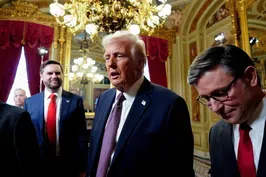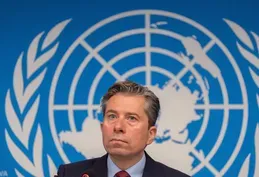
Capehart and Continetti on Trump's executive power
Clip: 2/7/2025 | 10m 53sVideo has Closed Captions
Capehart and Continetti on Trump pushing the limits of executive power
Washington Post associate editor Jonathan Capehart and Matthew Continetti from the American Enterprise Institute join Geoff Bennett to discuss the week in politics, President Trump and his allies making quick progress on their goal of "deconstructing the administrative state," Elon Musk gaining unprecedented access to information, Congress ceding power to the White House and the new DNC chair.
Major corporate funding for the PBS News Hour is provided by BDO, BNSF, Consumer Cellular, American Cruise Lines, and Raymond James. Funding for the PBS NewsHour Weekend is provided by...

Capehart and Continetti on Trump's executive power
Clip: 2/7/2025 | 10m 53sVideo has Closed Captions
Washington Post associate editor Jonathan Capehart and Matthew Continetti from the American Enterprise Institute join Geoff Bennett to discuss the week in politics, President Trump and his allies making quick progress on their goal of "deconstructing the administrative state," Elon Musk gaining unprecedented access to information, Congress ceding power to the White House and the new DNC chair.
How to Watch PBS News Hour
PBS News Hour is available to stream on pbs.org and the free PBS App, available on iPhone, Apple TV, Android TV, Android smartphones, Amazon Fire TV, Amazon Fire Tablet, Roku, Samsung Smart TV, and Vizio.
Providing Support for PBS.org
Learn Moreabout PBS online sponsorshipGEOFF BENNETT: From Elon Musk gaining unprecedented access to sensitive government information, to Democrats trying to build what they call a bigger and better party, we turn tonight to the analysis of Capehart and Continetti.
That's Washington Post associate editor Jonathan Capehart and Matthew Continetti with the American Enterprise Institute.
David Brooks is away this evening.
It's good to see you both.
MATTHEW CONTINETTI, American Enterprise Institute: Good to see you.
GEOFF BENNETT: So, Donald Trump and his allies are making quick progress toward their stated goal of the deconstruction of the administrative state.
We have got takeovers and the hollowing out of major government agencies, offering severance agreements to government workers, pausing federal grants and loans, which, of course, is now tied up in the courts.
Jonathan, are the shockwaves being felt across the government signs of a super committed new administration shaking up the status quo, or are we witnessing the full assault on the limits of executive power?
JONATHAN CAPEHART: Both, Geoff.
Both.
Remember, Donald Trump campaigned.
He told us this is what he was going to do.
Project 2025 is all about doing what is happening right now.
And so they are trying to deconstruct, as I think of Steve Bannon, who said, the administrative state.
And they are -- as I said last week, President Trump and Elon Musk, in particular, are taking a wrecking ball to the federal government by sowing, sure, chaos and confusion and fear.
But he's following through on what he promised to do.
GEOFF BENNETT: How do you see it, Matt?
MATTHEW CONTINETTI: I think Jonathan's right.
This was a promise made, promised kept, as they like to say in Trump world.
And I think what's important to understand about Trump and how he's going about these initial weeks is, he wants to deliver results.
Trump always feels as though the political class that preceded him talked a big game, but never accomplished anything.
So we had the Grace Commission during Reagan.
We had Al Gore's reinventing government.
We had the commissions dealing with the debt and taxes during the Obama years.
Nothing happened.
And so here he is.
Elon Musk says he wants to treat the federal government like a new acquisition.
Well, Donald Trump says, go for it.
Let's see what happens.
GEOFF BENNETT: What about the question Democrats are raising, Jonathan?
Where are the guardrails?
Who's going to stop any of this?
Democrats in Congress obviously don't have any power.
Republicans in Congress are moving in lockstep with this administration.
The courts have stepped in where they deem appropriate, but obviously can't keep up with the velocity of the Trump administration.
Is there any guard against his instinct to wield, to really claim and wield expansive power?
JONATHAN CAPEHART: Well, see, here's the thing.
Right now, the courts are the only guardrail.
And I think people need to understand that the courts operate on a timetable that is completely different than the rest of us.
And we just have to appreciate that.
The fact that citizens and lawmakers and organizations have gone to court to stop President Trump on a whole host of things, from birthright citizenship to the buyout plans, that is right now sort of the, for lack of a better saying, court of last resort.
In the old days, Geoff and Matthew, it used to be that Congress would be the backstop, would be the entity, the legislative branch standing up for its prerogatives and saying, Mr. President, no, we are the ones who decide what agencies come and go.
We are the ones who decide what the budget will be.
But, instead, the MAGA Republicans who were there in Congress, from Speaker Johnson on down, they're happy.
They're happy to go along with what President Trump and Elon Musk are doing, which is why they are silent on a whole host of things that even 10 years ago would have had Congress up in arms.
GEOFF BENNETT: How do you view Congress really abdicating their role, ceding their power to the executive?
MATTHEW CONTINETTI: Well, I think this process of ceding power to the executive is decades in the making, and it's bipartisan.
Congress has really just become an investigatory body that delegates tremendous authority to the executive branch of government and the bureaucracy.
And we now see the results when you have Trump come in his second term wanting to leave a profoundly changed government in his wake when he departs the Oval Office.
And you see that, because of acts of Congress, Congress' own denial of its role, the president has enormous power to wield.
And let's remember, when President Obama said he had a pen and a phone, the first Trump administration used a lot of executive orders.
Joe Biden tried to cancel student debt through executive order.
This process we're seeing is long in the making.
And I think one reason Washington is stunned is that you have an outsider in Elon Musk actually punching the delete button on some of these programs.
GEOFF BENNETT: Jonathan, Matthew raised the question I was going to ask you, because that's what I have heard from Republicans this past week, that Democrats can't in good faith criticize Donald Trump, when Joe Biden tried to unilaterally without Congress waive $400 billion worth of student loan debt.
And when the Supreme Court said no, you can't do that, he basically shrugged and then tried to do it via piecemeal approach.
JONATHAN CAPEHART: This is like comparing apples and cannonballs.
What we're seeing coming from the Trump administration is executive orders uprooting and upending the federal government.
And what makes this all the more galling and terrifying for a lot of people is that he has delegated a lot of power to someone who was elected to no office, to someone who was not confirmed by the Senate.
He is accountable to no one, except for maybe, except for maybe President Trump.
And President Trump has already said, well, he will only do things that we want him to do.
Well, so far, Elon Musk is doing everything that Donald Trump wants to do.
That is what is so terrifying about this moment, is that you have an unelected person, who also happens to be the wealthiest person in the world, and also the wealthiest person in the world who owns a huge social media megaphone, and is able to manipulate the information that the people on that huge platform receive.
That's what is so dangerous about what is happening now.
And as we're trying to compare President Biden's executive order on student loans and what Donald Trump is doing, Donald Trump is destroying.
President Biden signed an executive order and, yes, pushed the limits of executive action, but to the benefit of people who were drowning in student debt.
He did it in order to help people, not to destroy the government that the American people depend on for a whole host, a whole host of things.
GEOFF BENNETT: Let's shift our focus back to Elon Musk for a second, because, Jonathan, we actually have the sound that you mentioned.
Here is how President Trump responded to a reporter's question about whether he gave Elon Musk any red lines.
QUESTION: Is there anything you have told Elon Musk he cannot touch?
DONALD TRUMP, President of the United States: Well, we haven't discussed that much.
I will tell him to go here, go there.
He does it.
He's got a very capable group of people, very, very, very, very capable.
They know what they're doing.
They will ask questions and they will see immediately if somebody gets tongue-tied that they're either crooked or don't know what they're doing.
GEOFF BENNETT: So, Matt, it would appear that Elon Musk has a fairly broad mandate, in that it's not spelled out at all, I mean, if you take into account what President Trump is saying there.
MATTHEW CONTINETTI: I think President Trump has told Elon Musk, let's change the government, let's slim it down, let's dramatically reduce the federal work force.
And if you need to go fast and break things, as they say in Silicon Valley, to do that, that's fine.
I will say that if Elon Musk were the health care czar or the energy czar coming up with big plans for government spending or to combat global warming, I'd think there'd be a lot less uproar in Washington, D.C.
It's the fact that he has the goal of changing the federal government and limiting it, at a time when we have record deficits and debts, that I think is angering a lot of people who are invested in the current system.
GEOFF BENNETT: In the time that remains, I want to return to this open question about the path forward for Democrats, because, Jonathan, you wrote a column for The Washington Post this past week, the thesis of which is that the Democratic Party's issue isn't rooted in policy.
It's rooted in perception.
Tell us more about that and whether Ken Martin, the newly elected head of the DNC, can effectively change that.
JONATHAN CAPEHART: Well, the perception of the Democratic Party is it's filled with elites who only care about niche issues and don't listen to the rest of us.
And, as everyone knows, in a lot of instances, perception is reality.
I was one of three people, MSNBC anchors, who hosted the last DNC forum.
And there were two instances that happened that sort of put this perception in high relief.
One was a question asking for a commitment to dedicated seats for transgender folks within the party to be -- the serve within the party in the governing structure.
Another was protesters who were loudly screaming about climate change and getting big money out of politics, something that everyone on that stage was for.
And yet no one wanted to listen to what they had to say.
And what was great about -- good about those two moments that were instructive, Faiz Shakir, a friend of "PBS News Hour," was the only person the stage who did not raise his hand on the transgender question.
There was also one on the question for seats for Muslim DNC members.
He said, I don't think we should be dividing people up by identity.
We should focus on people who are up for the mission and the program of the DNC and have them bring their identity to the table.
He's absolutely right.
And then with the protesters, Jason Paul said, this is the way people in the country view the Democratic Party, and that is our problem.
That's why I say the policy isn't the problem.
Democrats have policies that address the American people's issues.
It's the perception.
And that is what Ken Martin has to do.
And we're about to find out if he's able to do it, to change that perception.
GEOFF BENNETT: Jonathan Capehart and Matthew Continetti, thanks again for being with us.
I appreciate it.
JONATHAN CAPEHART: Thanks, Geoff.
A Brief But Spectacular take on making each day opening day
Video has Closed Captions
Lawrence Chu's Brief But Spectacular take on treating each day like a grand opening (3m 50s)
Chicago Fed president on the new jobs report and economy
Video has Closed Captions
Chicago Fed president on what the new jobs report says about the economy (6m 37s)
Congress struggles to keep up as Trump reshapes government
Video has Closed Captions
Courts and Congress struggle to keep up with Trump as he reshapes American government (8m 19s)
Displaced Gazans return to face uncertain future
Video has Closed Captions
Displaced Gazans return to face shattered homeland and uncertain future (3m 32s)
The growing concerns around the boom in sport betting
Video has Closed Captions
The growing concerns around the boom in sport betting (8m 31s)
News Wrap: Heavy rains in California trigger landslides
Video has Closed Captions
News Wrap: Heavy rains in California trigger landslides (4m 59s)
Top UN humanitarian official on the situation in Gaza
Video has Closed Captions
Top UN humanitarian official describes the current situation in Gaza (5m 12s)
Providing Support for PBS.org
Learn Moreabout PBS online sponsorshipMajor corporate funding for the PBS News Hour is provided by BDO, BNSF, Consumer Cellular, American Cruise Lines, and Raymond James. Funding for the PBS NewsHour Weekend is provided by...



















